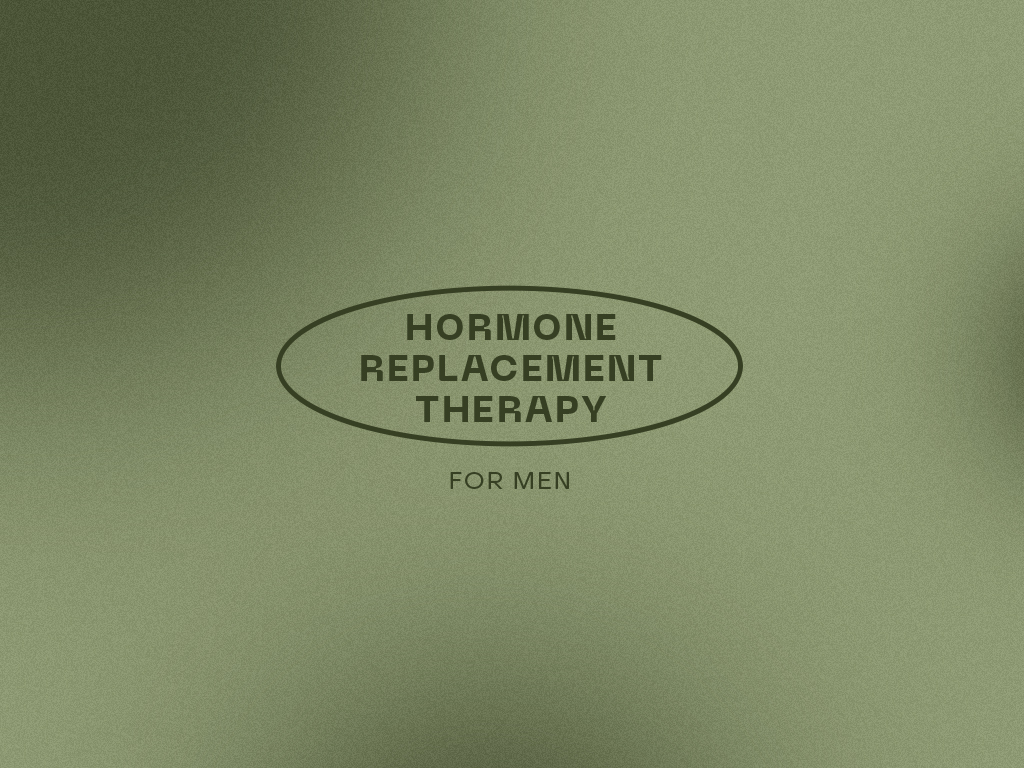Blog
Hormone Replacement Therapy for Men

Hormone replacement therapy (HRT) is a therapy in which exogenous hormones (hormones from outside of the body) are given to an individual to replace low levels of endogenous hormones (hormones from inside of the body). There are many different hormones and reasons why certain hormones might be lower than normal. HRT is used when 1) other interventions such as lifestyle and supplementation fail to achieve the desired outcome and 2) when the benefits outweigh the risks. This therapy is highly individualized to the person and must be done under the care of a healthcare professional who monitors the process closely. Note the HRT in the blog focuses on reproductive hormones. Now, let’s talk about HRT for men…
How do sex hormones function throughout the body?
It’s important to first understand how sex hormones are made and how they function in the body, normally. All sex hormones are made from cholesterol inside of endocrine (hormonal) organs in response to signals from the brain. Endocrine organs include the testes (makes testosterone), adrenal glands (makes androgens like DHEA that can be converted into testosterone), and fat tissue (can convert testosterone into estrogen). Typically, testosterone levels naturally decline with age, starting after age 30 and continuing at a rate of 1% per year throughout the rest of life. However, many men struggle with low testosterone levels before age 30 due to a number of different causes and influences.
The primary hormones replaced by HRT in men include testosterone and DHEA. Hormones make up our body’s communication system and each hormone has a multitude of important roles to play. When hormones are out of balance, things in the body start to go awry.
Here are main signs and symptoms:
- Low testosterone – loss of muscle/bone mass, weight gain, low energy, low libido, low motivation, low confidence, depression, gynecomastia (enlarged breasts), erectile dysfunction, cardiovascular disease risk
- Low DHEA – fatigue, poor concentration, depression, poor immunity, loss of muscle/bone mass, low libido, hormone imbalance (it is a precursor to other hormones)
Special considerations for men on testosterone replacement therapy (TRT):
- High testosterone – TRT may lead to excessively elevated testosterone causing symptoms including acne and aggression. To prevent this, labs should be run regularly with the prescribing doctor who will help find the testosterone level that is optimal for each individual man.
- High estrogen – high testosterone may push the conversion of testosterone to estrogen causing symptoms including emotional sensitivity, breast tenderness/enlargement, and water retention. To prevent this, men may be given aromatase inhibitors to block the enzyme that converts testosterone into estrogen. Since being overweight/obese promotes this conversion, these men are also encouraged to lose body fat.
- High dihydrotestosterone (DHT) – high testosterone may increase DHT levels causing symptoms including hair loss, prostate issues, and urinary problems. To prevent this, men may be given 5-alpha reductase inhibitors to block the enzyme that converts testosterone into DHT.
- High sex hormone binding globulin (SHBG) – high levels of SHBG can bind testosterone in the blood, decreasing the levels of free testosterone (the active form). To prevent this, men may be given targeted recommendations to decrease SHBG (e.g. boron supplementation).
- High hemoglobin and hematocrit – TRT can increase the amount of red blood cells in the body, causing the blood to become too thick and impairing normal blood flow. To prevent this, men may be encouraged to donate blood periodically.
- TRT shuts down endogenous testosterone production and can lead to infertility and testicular atrophy. To prevent this, men may be given adjunctive medications (HCG, Enclomiphene, etc.) to preserve endogenous testosterone production.
Who is a good candidate for HRT?
As you can see, there are many consequences of hormonal imbalance, which explains the want or need for HRT. Men with conditions that cause testosterone to be too low are the ones that can benefit most from HRT, including:
- Men with primary hypogonadism, a condition in which testosterone deficiency is due to dysfunction of the testes
- Men with secondary hypogonadism, a condition in which testosterone deficiency is due dysfunction of the brain (hypothalamus and/or pituitary gland) – concussions and traumatic brain injuries are common contributors
- Men with suboptimal testosterone levels causing symptoms that are impairing their quality of life including decreased mental stamina, muscle strength, and interest in sex
What are the options for HRT?
Well, there are several different types of HRT and forms of application. The type and form that is best for you will be a decision made with your doctor, who will fill you in on specific instructions and safety considerations. The primary type of TRT is synthetic HRT (made in a laboratory). Forms of TRT include intramuscular injections (most common), subcutaneous pellets, topical (creams, gels, patches), and oral (not often used due to poor absorption).
Note: There are risks associated with HRT depending on the type, dose, duration of use, and health status. Individuals on HRT should undergo routine lab testing and medical evaluation for dosing adjustment and continued safety assurance.
LIVV is proud to offer HRT as an option for those in need – our knowledgeable naturopathic doctors (ND) will be able to prescribe hormones and perform regular testing in addition to optimizing nutrition and lifestyle to promote hormone balance in whatever stage of life or health you are in. The benefits of seeing an ND for HRT are that they are experts on TRT, they use natural methods to troubleshoot TRT issues (such as herbal aromatase and 5-alpha reductase inhibitors), and they focus on optimal lab values (rather than standard values). Give us a call to set up your consultation and get started!
For more information on testosterone check out our previous blogs:
Why Optimized Testosterone Will Transform Your Life
Written by Jordan Valdez, RDN


